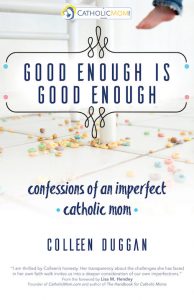Good Enough is Good Enough: Confessions of an Imperfect Catholic Mom
by Colleen Duggan
 With social media and smartphones, people are more connected—at least digitally—than ever before. Instagram and Facebook provide ample opportunities for families and friends to share their lives with others and foster community. However, this constant connectedness can foster a culture of comparison that sometimes leads to a disordered expectation of perfection. Even Catholic mothers can fall prey to this idea that their lives should look like the filtered pictures they scroll through on their phones. Now more than ever, the Church needs honest, authentic voices that portray both the beauty and the struggle of marriage, parenthood, and the Christian vocation. Colleen Duggan’s Good Enough is Good Enough: Confessions of an Imperfect Catholic Mom offers an antidote to parenting perfectionism and encourages parents to embrace the adventure of family life with grace and mercy.
With social media and smartphones, people are more connected—at least digitally—than ever before. Instagram and Facebook provide ample opportunities for families and friends to share their lives with others and foster community. However, this constant connectedness can foster a culture of comparison that sometimes leads to a disordered expectation of perfection. Even Catholic mothers can fall prey to this idea that their lives should look like the filtered pictures they scroll through on their phones. Now more than ever, the Church needs honest, authentic voices that portray both the beauty and the struggle of marriage, parenthood, and the Christian vocation. Colleen Duggan’s Good Enough is Good Enough: Confessions of an Imperfect Catholic Mom offers an antidote to parenting perfectionism and encourages parents to embrace the adventure of family life with grace and mercy.
Colleen Duggan opens the book with the honesty and warmth of a down-to-earth friend, admitting that as a young mother she desired “the perfect catholic family.” Through her many personal stories, readers learn how Duggan slowly relinquished her love of control for a life of surrender, one that embraces the mercy and unconditional love of God. Mothers especially cannot forget that God’s “grace is sufficient” and that His “power is made perfect in weakness.” (2 Corinthians 12:9) Unrealistic expectations—for their spouses, their children, and themselves—can often cause undue stress and thwart the noble efforts of parents to create a joy-filled Christian home. Duggan encourages mothers to let go of the fear of failure and trust God more.
Each chapter of the Good Enough is Good Enough begins with a confession and ends with some great advice, a few thoughtful reflection questions, and a prayer. First, Duggan says to let go of this idea that one can master motherhood. Instead, mothers should accept the fact that weaknesses and failures are part of the human condition and learn to place unshakeable faith in the healing power of Christ. Accepting the gift of grace and practicing patience with our inevitable imperfections are key components to parenting with peace.
Another important area Duggan addresses is the all-important topic of self-care. Mothers cannot function—much less thrive—on fumes, but far too often the desire to sacrifice for the family can lead to mommy burn-out. Duggan offers practical advice and personal experiences that shed light on the why and the how of self-care, not only for the mother, but for the marriage as well.
Catholic mothers often worry about whether their children will embrace the love of Christ and stay close to His Church; Duggan tackles this fear head-on in her chapter on raising children in the Catholic faith. “One of the greatest things lacking in our presentation of the faith to our children,” Duggan admits, “was a respect for our children’s freedom, especially the freedom for them to behave in age-appropriate ways.” By accepting the limitations of her children, Duggan helped her children experience not only family prayer, but also the mass, with greater joy. Letting go of fear and focusing on fidelity helped Duggan learn to trust God with her children and their own relationship with Christ and His Church.
The most poignant section of the book shares the story of the author’s son, Patrick, who was diagnosed with a chronic disease, neurofibromatosis. Learning to surrender to God when a child is suffering is one of the hardest lessons a mother can learn. Through her son’s struggles, Duggan realized that all the other ambitions she had for her child paled in comparison with the ultimate goal: leading her son to union with God forever. No matter what struggles a mother experiences with her children, this book offers profound insights on surrender and trust.
In the final chapter, Duggan shares her own struggle with comparison and encourages other mothers to embrace the unique call of their own individual family. Duggan inspires mothers to treat themselves and others with a great deal of mercy by frequently receiving the mercy of God in the sacrament of Confession.
Good Enough is Good Enough: Confessions of an Imperfect Catholic Mom emboldens mothers everywhere to embrace the messiness of family life and forge ahead in the profound task of parenthood with trust in the goodness of God. As St. Pope John Paul the Great once said, “we are not the sum of our weaknesses and failures, we are the sum of the Father’s love for us,” and these confessions encourage all the faithful to lead a life of trust over fear and patience over perfectionism.
About the Reviewer: Kathleen O’Beirne is a wife, mother of five, a freelance writer, 8th Grade Literature Teacher and a volunteer in the Marriage Preparation Program for the Arlington Diocese.




